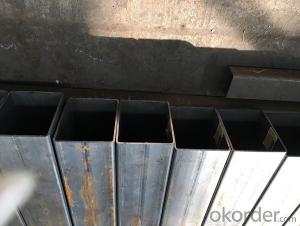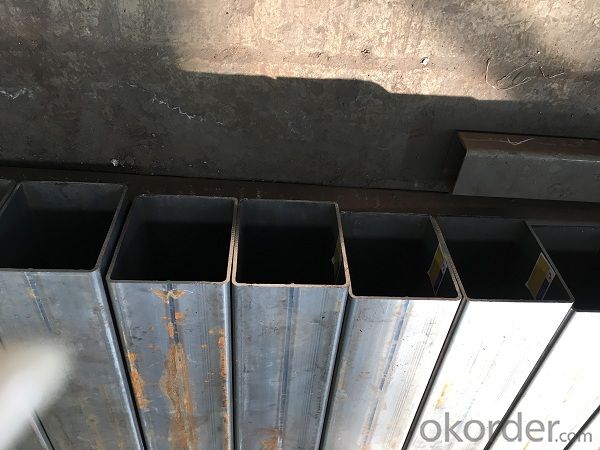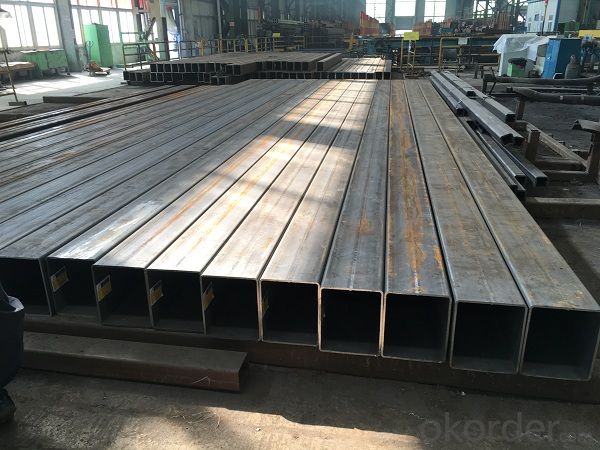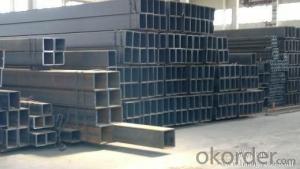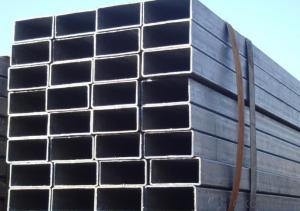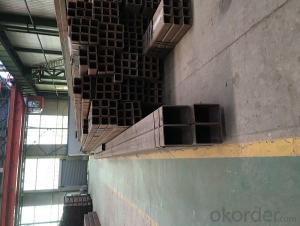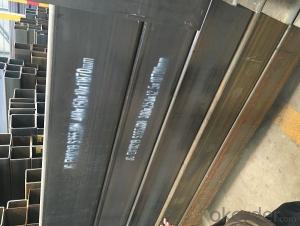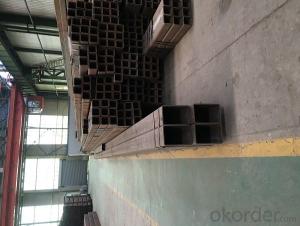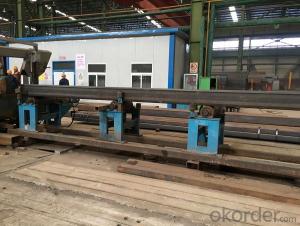low carbon square rectangular pipe hot sell
- Loading Port:
- Tianjin
- Payment Terms:
- TT OR LC
- Min Order Qty:
- 20 m.t.
- Supply Capability:
- 7000 m.t./month
OKorder Service Pledge
OKorder Financial Service
You Might Also Like
Specification
1、Structure of low carbon square rectangular pipe hot sell:
Square tube, square tube is a kind of call and rectangular tube, is equal and not equal to the length of steel pipe. Is the strip through the process of processing roll system. In general is the strip through the demolition of the package, flat, curly, welded to form a circular tube, and then rolled into a square tube and then cut into a square tube and then cut into the required length.
2、A variety of low carbon square rectangular pipe hot sell :
• High manufacturing accuracy
• High strength
• Small inertia resistance
• Strong heat dissipation ability
• Good visual effect
• Reasonable price
3、 A variety of low carbon square rectangular pipe hot sell:
Standard | GB, DIN, ASTM |
Grade | 10#-45#, 16Mn 10#, 20#, 45#, 16Mn |
Thickness | 1.5 - 25 mm |
Section Shape | Square and rectangular |
Outer Diameter | 20*20 mm-------400*400mm 20*30mm*300*500mm |
Place of Origin | Tianjin, China (Mainland) |
Length | 3-12M |
Outer Diameter | 20*20 mm-------400*400mm 20*30mm*300*500mm |
Grade | 235B 345B |
Standard | ASME, ASTM |
1) Material:(ASTM A 106/A53 GRB.API5LGRB,GB,235B,345B
2) Specification range:OD: 20*30mm----300*500mm 20*20 mm---400*400mm ,WT: 1.5 - 25 mm ,length:3-12m or according to the requirement of clients.
3) Excutive standards:GB,ASME API5L.ASTM A 106/A53,Despite of the above
4) Surface:black lacquered,varnish coating or galvanized.
5) Ends:Beveled or square cut ,painted.
6) Packing:bundles wrapped with strong steel strip,seaworthy packing.
4、Packaging & Delivery
Packaging Details: | seaworthy package,bundles wrapped with strong steel strip |
Delivery Detail: | 15-30days after received 30%TT |
5、FAQ of low carbon square rectangular pipe hot sell
①How is the quality of your products?
Our products are manufactured strictly according to national and internaional standard, and we take a test
on every pipe before delivered out. If you want see our quality certifications and all kinds of testing report, please just ask us for it.
Guaranteed: If products’ quality don’t accord to discription as we give or the promise before you place order, we promise 100% refund.
②How about price?
Yes, we are factory and be able to give you lowest price below market one, and we have a policy that “ for saving time and absolutely honest business attitude, we quote as lowest as possible for any customer, and discount can be given according to quantity”,if you like bargain and factory price is not low enough as you think, just don’t waste your time.Please trust the quotation we would give you, it is professional one.
③Why should you chose us?
Chose happens because of quality, then price, We can give you both.Additionally, we can also offer professional products inquiry, products knowledge train(for agents), smooth goods delivery, exellent customer solution proposals.Our service formula: good quality+good price+good service=customer’s trust
SGS test is available, customer inspection before shipping is welcome, third party inspection is no problem.
6、 low carbon square rectangular pipe hot sell Images:
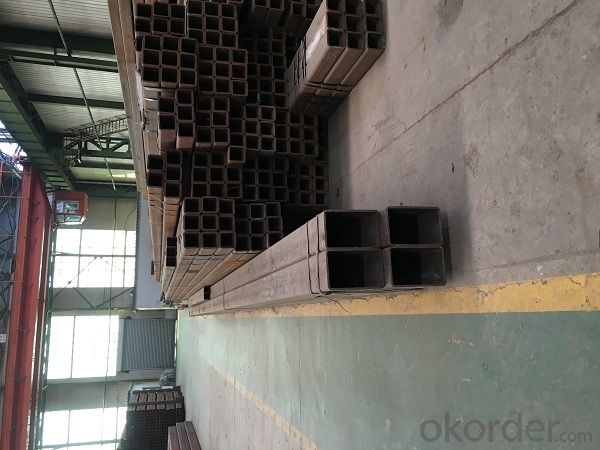
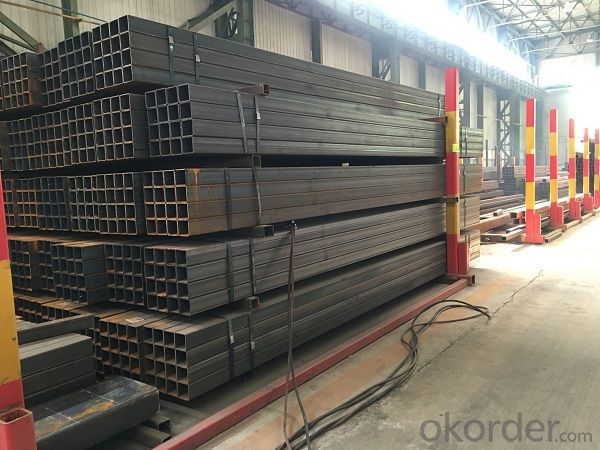
- Q: How do you determine the required support spacing for steel pipes?
- The required support spacing for steel pipes is determined based on several factors including the pipe material, size, weight, and operating conditions. Generally, industry standards and guidelines such as those provided by the American Society of Mechanical Engineers (ASME) are followed to calculate the appropriate spacing. These standards take into account factors such as pipe deflection, thermal expansion, vibration, and load-bearing capacity to ensure the pipes are adequately supported and do not experience excessive stress or deformation.
- Q: What is the minimum temperature that steel pipes can handle?
- The minimum temperature at which steel pipes can withstand depends on the particular grade and composition of the steel. In general, steel pipes can endure extremely low temperatures without encountering significant issues. In fact, numerous steel varieties are specifically engineered to endure freezing temperatures, making them suitable for a range of uses in industries like oil and gas, construction, and cryogenics. However, it is crucial to acknowledge that steel may become more brittle at exceedingly low temperatures, which can impact its mechanical properties. Therefore, it is vital to meticulously choose the appropriate steel grade and consider any specific requirements or limitations for the desired application when determining the minimum temperature that steel pipes can handle.
- Q: What is the difference between hot dip galvanized steel pipe and galvanized steel pipe?
- Galvanized steel pipe is commonly known as "cold plated tube", using electroplating process, only galvanized steel pipe in the outer wall, the wall of the pipe is not galvanizedHot dip galvanized steel pipe adopts hot-dip galvanizing process, and the inner and outer walls of the steel pipe have zinc coating.
- Q: What is the weight of steel pipes?
- The weight of steel pipes can vary depending on their size, length, and thickness. However, on average, steel pipes typically weigh between 1.1 to 1.4 pounds per foot.
- Q: What are the different methods of joining steel pipes?
- There are several methods of joining steel pipes, including welding, threading, flanging, grooving, and using mechanical couplings.
- Q: Outside diameter 60, thickness 3.5 seamless steel tube, how many kilograms per meter?
- Outside diameter 60mm, thickness 3.5mm seamless steel tube per metre weight: 4.88 kg. When calculating the theoretical weight (Kg/m) per metre of steel tube, the theoretical weight meter of the steel tube can be checked directly, and the formula formula can also be used.
- Q: Can steel pipes be used for gas lines?
- Yes, steel pipes can be used for gas lines. They are commonly used due to their strength, durability, and resistance to high pressure and corrosion. However, it is important to ensure that the steel pipes are specifically designed and certified for use with gas to ensure safety and compliance with industry standards.
- Q: How are steel pipes used in underground drainage systems?
- Steel pipes are commonly used in underground drainage systems to transport wastewater and stormwater away from buildings and infrastructure. These pipes are durable and resistant to corrosion, making them suitable for underground applications. They are typically used for main sewer lines and stormwater drains, providing a reliable and long-lasting solution for effective drainage.
- Q: What's the use of steel pipe?
- No other type of steel can replace the steel tube entirely, but the steel tube can take the place of some sections and bars. Steel pipe is very important to the development of national economy and the improvement of human life quality, much better than other steel products. From the people's daily utensils, furniture, water supply and drainage, gas supply, ventilation and heating facilities to all kinds of agricultural machinery equipment manufacturing, underground resources development, national defense and space use guns, bullets, missiles, rockets and so cannot do without steel.
- Q: What are the common applications of seamless steel pipes?
- Due to their unique properties, seamless steel pipes are widely used in various industries. Here are some of the most common applications: 1. The oil and gas industry extensively utilizes seamless steel pipes for transporting oil, gas, and other fluids. These pipes are preferred because of their high strength, durability, and resistance to corrosion, making them suitable for harsh environments. 2. Seamless steel pipes are extensively used in construction projects, such as building, bridge, and tunnel construction. They are ideal for structural applications due to their ability to withstand heavy loads and provide excellent strength and stability. 3. The automotive industry relies on seamless steel pipes for manufacturing automotive parts, including exhaust systems, engine components, and hydraulic systems. These pipes offer high strength, reliability, and resistance to heat, making them suitable for demanding automotive applications. 4. Various mechanical and engineering applications benefit from the usage of seamless steel pipes. They are commonly used for carrying fluids, gases, and steam, as well as for transmitting power in machinery and equipment. 5. Power plants extensively utilize seamless steel pipes for transporting steam and hot water. These pipes are capable of withstanding high pressure and temperature, making them ideal for power generation applications. 6. The petrochemical industry heavily relies on seamless steel pipes for transporting chemicals, gases, and liquids. These pipes have excellent resistance to corrosion, which is essential when dealing with hazardous and corrosive substances. 7. The mining industry utilizes seamless steel pipes for various applications, including the transportation of slurry, water, and other mining-related fluids. These pipes offer durability, reliability, and resistance to abrasion, making them suitable for the challenging mining environment. 8. The aerospace industry finds applications for seamless steel pipes in manufacturing aircraft components, such as hydraulic systems, fuel lines, and structural parts. These pipes provide a high strength-to-weight ratio and resistance to extreme temperatures and pressure. Overall, seamless steel pipes play a crucial role in a wide range of industries. Their exceptional properties, including strength, durability, resistance to corrosion and high temperatures, make them an essential component in various industrial processes and infrastructure development.
Send your message to us
low carbon square rectangular pipe hot sell
- Loading Port:
- Tianjin
- Payment Terms:
- TT OR LC
- Min Order Qty:
- 20 m.t.
- Supply Capability:
- 7000 m.t./month
OKorder Service Pledge
OKorder Financial Service
Similar products
Hot products
Hot Searches
Related keywords
